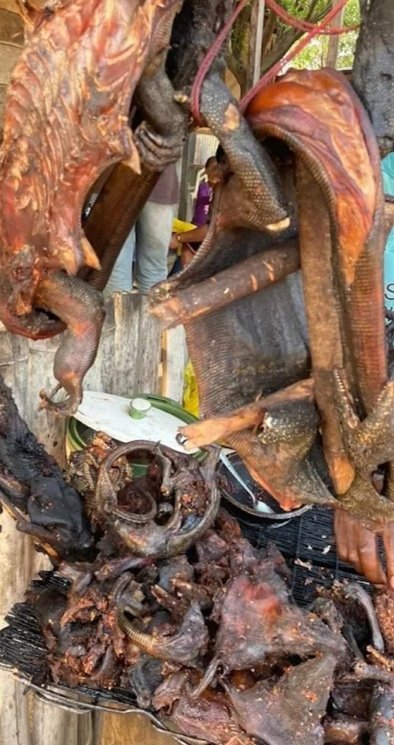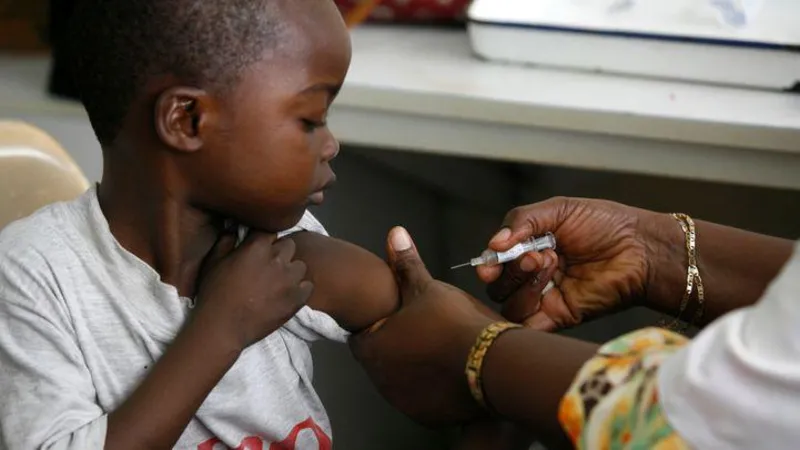Bushmeat consumption remains a deeply rooted cultural practice in Nigeria, but experts warn it is a public health disaster waiting to happen.
In this special report, Africa Health Report correspondent Juliet Jacob, investigates the growing risks posed by the illegal bushmeat trade, the communities that depend on it, and why urgent action is needed to prevent Nigeria from becoming ground zero for the next deadly zoonotic outbreak.
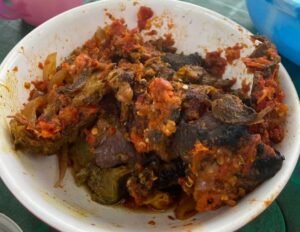
During the 2025 World Zoonoses Day, Wild Africa, a conservation non-profit body, raised the alarm that the country could become the epicentre of the next deadly zoonotic disease due to its widespread consumption of wildlife.
“Ebola, Mpox (Monkeypox), Lassa Fever, and Anthrax continue to pose serious risks due to the widespread bushmeat trade,” warned Wild Africa’s West Africa representative, Dr Mark Ofua, adding, “Embracing the One Health approach, which connects human, animal, and environmental health, will enable Nigeria to avert future outbreaks.”
The Ever-Present Threat of Zoonotic Diseases
Zoonotic diseases are infections that spread from animals to humans through direct contact such as bites, scratches, or exposure to faeces, as well as via consumption of animal products or contact with contaminated environments like wet markets and abattoirs.
The World Health Organisation (WHO) estimates that 75% of emerging infectious diseases in humans originate from animals, with nearly three-quarters coming from wildlife.
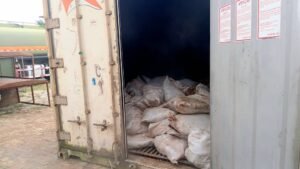
Despite these dangers, bushmeat markets remain widespread in Nigeria, where endangered species such as pangolins, bats, monkeys, and snakes are sold openly.
Bushmeat Consumption: A Thriving Urban Culture
Bushmeat has long been a source of protein for remote communities. However, Wild Africa warns that its rising popularity in urban centres such as Lagos, Abuja, and Port Harcourt is heightening public health risks.
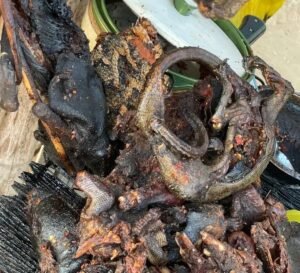
Interview: Life at the Bushmeat Market
Africa Health Report spoke to a bushmeat seller, Madam Joy Omale, in one of the most popular bushmeat joints in Ushafa under Bwari Area Council, Abuja:
“My grandmother sold bushmeat, my mother sold bushmeat, and I am still selling bushmeat today. We sell crocodiles, bats, antelopes, tortoises, porcupines, and alligators. Today I only have grasscutters. People buy it because they like the taste and believe it gives them strength.”
When asked about the health warnings and legal risks, she shrugged:
“We hear these warnings, but what will I eat if I stop? This is what has sent my children to school.”
Another seller, Mrs Doshima, added:
“It is bushmeat that feeds us. We don’t think about diseases. If the government wants us to stop, they should give us another business.”
In another interview with Africa Health Report, a man who identified himself simply as Mr. Thomas said he often comes to eat bushmeat with his wife.
“I always come here most of the time to eat bushmeat. If my wife is not here with me, I usually buy and take it home for her. We’ve been eating bushmeat for years and have never gotten any disease from it. We are Africans. I don’t believe such things can happen to us. Our forefathers ate bushmeat and nothing happened to them, so I don’t think anything will happen to us for eating it,” he said.
Another respondent, Mr fidelis, shared a similar view.
“I have been eating bushmeat since I was small, and nothing has happened to me. I used to take it with palm wine with my dad back in the village. Even now, I haven’t experienced any disease from eating bushmeat. But I don’t eat just any bushmeat; I mostly eat grasscutter. I don’t believe such can kill an African because it’s something our grandfathers used to eat. I come to this bushmeat joint in Ushafa like two or three times a week. They say disease no dey (sic) kill African man.”
Mrs Simeon said, “The only meat my family and I eat are those everyone is familiar with – goat meat, chicken, turkey, and beef. I don’t eat any other type of meat apart from these. We don’t eat bushmeat at all because I just don’t like it, and thankfully, my husband and children don’t like it either. I’m aware of the diseases bushmeat can cause, so we completely avoid it. Even when it comes to pomo, (Dried cow skin) I don’t eat it because I’m not sure if it’s truly cow skin or something else they’re selling to us. I’m always very careful about what I eat.”
Deadly Numbers: A Catalogue of Threats
Wild Africa shared alarming statistics with Africa Health Report:
Mpox: 3,771 suspected cases and 1,086 confirmed cases since 2017 in Nigeria.
Yellow Fever: 589 suspected cases in the first four months of 2024.
Anthrax: Outbreaks in neighbouring Ghana killed 97 animals and infected several people.
Lassa Fever: Remains endemic in Nigeria, mainly spread by rodents.
Marburg Virus: Recent outbreaks in West Africa highlight the region’s vulnerability.
Also, the Nigeria Customs Service cracked down on illegal wildlife trade recently. Between December 2024 and June 2025, its Special Wildlife Office under the Customs Intelligence Unit seized:
6,087.9 kg of pangolin scales
4.15 kg of worked ivory
157 live African grey parrots
3,022 donkey skins
10,603 male donkey genitals
More than ten suspects were arrested during this period, with one conviction secured.
“Human-driven actions like habitat destruction, biodiversity loss, and illegal wildlife trade are intensifying the spread of zoonoses – threatening human health and undermining fragile ecosystems,” Dr Ofua warned.
Government Response and Enforcement Challenges
Although Nigeria’s Endangered Species Conservation and Protection Bill has passed its third reading in the House of Representatives and awaits Senate consideration, conservationists insist that stronger enforcement is needed.
“Previous crackdowns during Ebola and Anthrax outbreaks were temporary. Once public attention waned, traders and consumers returned to business as usual,” Dr Ofua told Africa Health Report.
Expert Insights: Risks of Bushmeat Consumption
President of the Association of Resident Doctors, University of Ilorin Teaching Hospital (ARD-UITH), Dr Yusuf Muhammed, said:
“Bushmeat carries deadly viruses such as Mpox, Ebola, and Lassa Fever. Mpox, for example, can spread through close contact, touching contaminated materials, or even consuming undercooked meat.
New strains can evade existing antibodies, posing higher risks of severe illness or death. The smallpox vaccine may offer some protection against Mpox, but its effectiveness against newer strains is uncertain.
Avoid bushmeat entirely, report suspected cases of infections, and practice hygiene when dealing with animals. Communities must prioritise health over tradition to avoid another pandemic.”
The Way Forward
Conservationists urge the Nigerian government to fast-track wildlife legislation, protect dwindling habitats, and invest in alternative livelihoods for communities dependent on bushmeat.
As Dr Ofua concluded:
“Safeguarding wildlife is safeguarding human health. If we continue on this path, it is not a matter of ‘if’ but ‘when’ Nigeria becomes ground zero for the next pandemic.”
Africa Health Report Interview
‘Bushmeat Consumption is a Ticking Time Bomb for Nigeria’ – Dr Oluwa Tosin
Africa Health Report recently spoke with a public health physician and infectious disease expert, Dr Oluwa Tosin, on the dangers of Nigeria’s bushmeat consumption culture and why urgent behavioural change is needed to avert the next deadly outbreak.
Africa Health Report: Why is bushmeat consumption such a serious health concern in Nigeria?
Dr Oluwa Tosin: Bushmeat consumption is a ticking time bomb. Many Nigerians do not realise that animals like bats, primates, and rodents often harbour deadly pathogens such as Ebola virus, Lassa fever virus, and even novel coronaviruses. These diseases can spill over to humans through hunting, processing, or eating infected meat, leading to outbreaks with high fatality rates. The cultural attachment to bushmeat blinds people to these risks.
Africa Health Report: Some argue that bushmeat is a traditional delicacy and a source of protein in rural areas. What is your response to that?
Dr Oluwa Tosin: I understand the cultural sentiment, but we must prioritise public health. There are safer protein alternatives like poultry, fish, and livestock. The reality is that bushmeat is not essential – it is a preference. And that preference can cost lives. We have seen communities wiped out by Ebola because of contact with infected animals. Prevention is always cheaper and easier than treatment or containment of an outbreak.
Africa Health Report: How can Nigeria effectively curb bushmeat consumption to prevent zoonotic diseases?
Dr Oluwa Tosin: First, there must be aggressive public health education campaigns to raise awareness about these dangers. Many people eat bushmeat without knowing the risks. Secondly, enforcement of wildlife protection and trade laws needs to be strengthened. Lastly, integrating the One Health approach, which links human, animal, and environmental health, will enable better surveillance and early detection of potential zoonotic threats.
Africa Health Report: If nothing is done, what could happen?
Dr Oluwa Tosin: If nothing is done, it is only a matter of time before Nigeria becomes the epicentre of another deadly zoonotic outbreak. We are already battling Lassa fever, and we have seen isolated Ebola scares. The bushmeat trade makes us extremely vulnerable. We must act now to protect our public health security.
Conclusion
Without urgent behavioural change, strengthened enforcement, and investment in safer livelihood alternatives, Nigeria’s bushmeat consumption culture remains a ticking time bomb for public health, conservationists warn.

